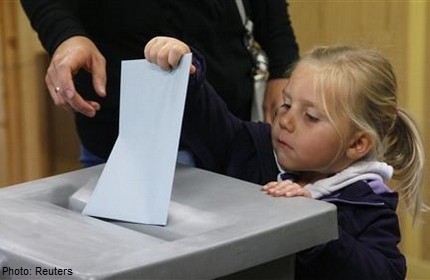Austrian ruling coalition faces far-right challenge in vote

VIENNA - Austrians voted in a parliamentary election on Sunday with a resurgent far right party challenging the political establishment and calling for an end to taxpayer-funded bailouts of struggling euro zone countries.
The governing Social Democrats (SPO) and their People's Party (OVP) conservative partners were counting on their record in piloting the Alpine republic through the global financial crisis relatively unscathed to win another five-year term.
Opinion polls indicated the two pro-Europe parties that have dominated post-war politics would scrape through to a combined majority, with the anti-immigrant and eurosceptic Freedom Party (FPO) hard on their heels.
"My gut feeling is fine," Chancellor Werner Faymann said as he cast his vote in Vienna. But the two mainstream parties may need to find a third partner to govern should two small blocs clear the 4 per cent hurdle for entering parliament.
The environmentalist Greens, an opposition party that has sided with the coalition on European issues such as creating the European Stability Mechanism (ESM) bailout fund, is the most likely option should the big two need a partner to govern.
Heinz-Christian Strache's FPO could improve on the 17.5 per cent it got in the 2008 election. It may even overtake the OVP despite competition from car-parts magnate Frank Stronach's new party, also eurosceptic but without the anti-foreigner tone.
Unlike in neighbouring Germany, where Chancellor Angela Merkel scored a landslide victory on Sept. 22 partly on the strength of the German economy, many Austrians feel hard done-by despite the lowest EU jobless rate and economic growth clearly above the EU average.
Around 19 per cent of the Austrian population are first- or second-generation immigrants, and the FPO plays on fears that these and asylum-seekers are depriving Austrians of benefits, while euro zone bailouts only benefit banks.
DISENCHANTMENT
A string of corruption scandals has contributed to disenchantment with mainstream Austrian politicians, helping trigger ructions at provincial elections this year in which long-entrenched parties were ousted from power.
At one polling station in Vienna's Leopoldstadt district close to the centre, voting was brisk but most voters declined to divulge their choice. Greens were most open about their vote.
Christine Kraus, a 47-year-old office worker from Klosterneuburg near Vienna, said earlier she would switch to the Greens from the Social Democrats as she was disappointed with the status quo and liked the personality of the Greens' leader.
"I'm your typical vote-switcher. I'll look at all the parties apart from the FPO and the BZO," she said, referring to the small, right-wing and economically liberal party that split from the FPO in 2005.
Turnout in dry, mild early autumn weather was expected to be close to the 79 per cent of the last national vote in 2008.
Polls close at 1500 GMT, when initial projections are set to appear. Preliminary official results are due around 1730 GMT, but in a very close election the outcome may not be clear until domestic absentee ballots are counted - by Monday.
Faymann's Social Democrats have led the pack from the start, campaigning on a platform of defending jobs and pensions and redistributing wealth via a new tax on millionaires.
The more free-market Peoples Party, led by Foreign Minister Michael Spindelegger, has called for liberating business of red tape to promote economic growth and help shore up public finances hit by aid to bailed-out banks.
Raimund Berger, a farmer selling his wares at a Vienna market on Saturday, said he would vote for the right wing.
"The left doesn't know how to do business," he said, adding he had nothing against foreigners who came to Austria, worked hard and integrated, but said they had no right to get benefits.
Faymann has said he wants to form a new coalition with the OVP should he win, while Spindelegger has declined to say the same, leaving the door open for a centre-right coalition.